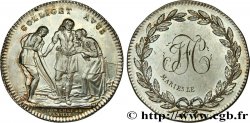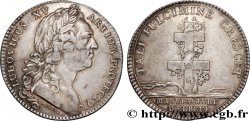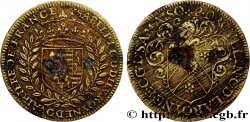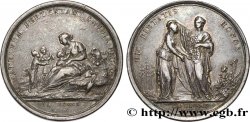E-auction 255-178711 - fjt_454244 - NORMANDY (GENTRY AND TOWNS OF...) Jeton Ar 28, prieur et juges-consuls de Dieppe 1762
You must signin and be an approved bidder to bid, LOGIN TO BID. Accounts are subject to approval and the approval process takes place within 48 hours. Do not wait until the day a sale closes to register. Clicking on « bid » constitutes acceptance of the terms of use of cgb.fr private e-auctions.
Bids must be placed in whole Euro amounts only. The sale will start closing at the time stated on the item description; any bids received at the site after the closing time will not be executed. Transmission times may vary and bids could be rejected if you wait until the last second. For further information ckeck the E-auctions F.A.Q.
NO BUYER'S FEE.
NO BUYER'S FEE.
| Estimate : | 60 € |
| Price : | 36 € |
| Maximum bid : | 37 € |
| End of the sale : | 05 March 2018 18:39:30 |
| bidders : | 7 bidders |
Type : Jeton Ar 28, prieur et juges-consuls de Dieppe
Date: 1762
Metal : silver
Diameter : 28 mm
Orientation dies : 6 h.
Weight : 9,6 g.
Edge : cannelée
Coments on the condition:
De minimes taches sinon un exemplaire superbe avec une très faible usure
Catalogue references :
Obverse
Obverse legend : LUD. XV. REX - CHRISTIANISS..
Obverse description : Buste lauré et drapé à droite de Louis XV [variété du n° 338] ; au-dessous signature B. DUV. .
Obverse translation : (Louis XV, roi très chrétien).
Reverse
Reverse legend : CIVICO. FŒDERE PRODERIT ; À L'EXERGUE EN DEUX LIGNES : ÆDIL. DEPPÆ COMIT./ 1762.
Reverse description : Écu aux armes de Dieppe sur un cartouche surmonté d’une tête d’ange et soutenu par deux Néréides ; signature D. V..
Reverse translation : (Elle sera utile à l'alliance civile - Assemblée des notables de Dieppe).
Commentary
Probablement une association avec un droit de Benjamin Duvivier et un revers de Jean Duvivier, son père. Les juridictions consulaires remontent à Henri II. Dans ces lieux de réunions, les marchands élisent entre eux un prieur et deux juges-consuls qui règlent en première instance les problèmes entre négociants. Les juges-consuls ou juges des tribunaux de commerce sont établis par un édit de 1563. Ils étaient souvent d’anciens consuls (officiers municipaux) d’où leur nom. Au XVIIIe siècle, les juges-consuls jugeaient souverainement jusqu’à 500 livres (au-delà, l’affaire relevait des Parlements).
Probably an association with a right of Benjamin Duvivier and a reverse of Jean Duvivier, his father. Consular jurisdictions date back to Henry II. In these meeting places, merchants elected among themselves a prior and two consul judges who settled in the first instance the problems between traders. The consul judges or judges of the commercial courts were established by an edict of 1563. They were often former consuls (municipal officers), hence their name. In the 18th century, the consul judges judged sovereignly up to 500 pounds (beyond this, the matter fell under the jurisdiction of the Parliaments).
Probably an association with a right of Benjamin Duvivier and a reverse of Jean Duvivier, his father. Consular jurisdictions date back to Henry II. In these meeting places, merchants elected among themselves a prior and two consul judges who settled in the first instance the problems between traders. The consul judges or judges of the commercial courts were established by an edict of 1563. They were often former consuls (municipal officers), hence their name. In the 18th century, the consul judges judged sovereignly up to 500 pounds (beyond this, the matter fell under the jurisdiction of the Parliaments).








 Report a mistake
Report a mistake Print the page
Print the page Share my selection
Share my selection Ask a question
Ask a question Consign / sell
Consign / sell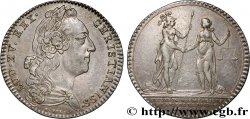
 Full data
Full data
